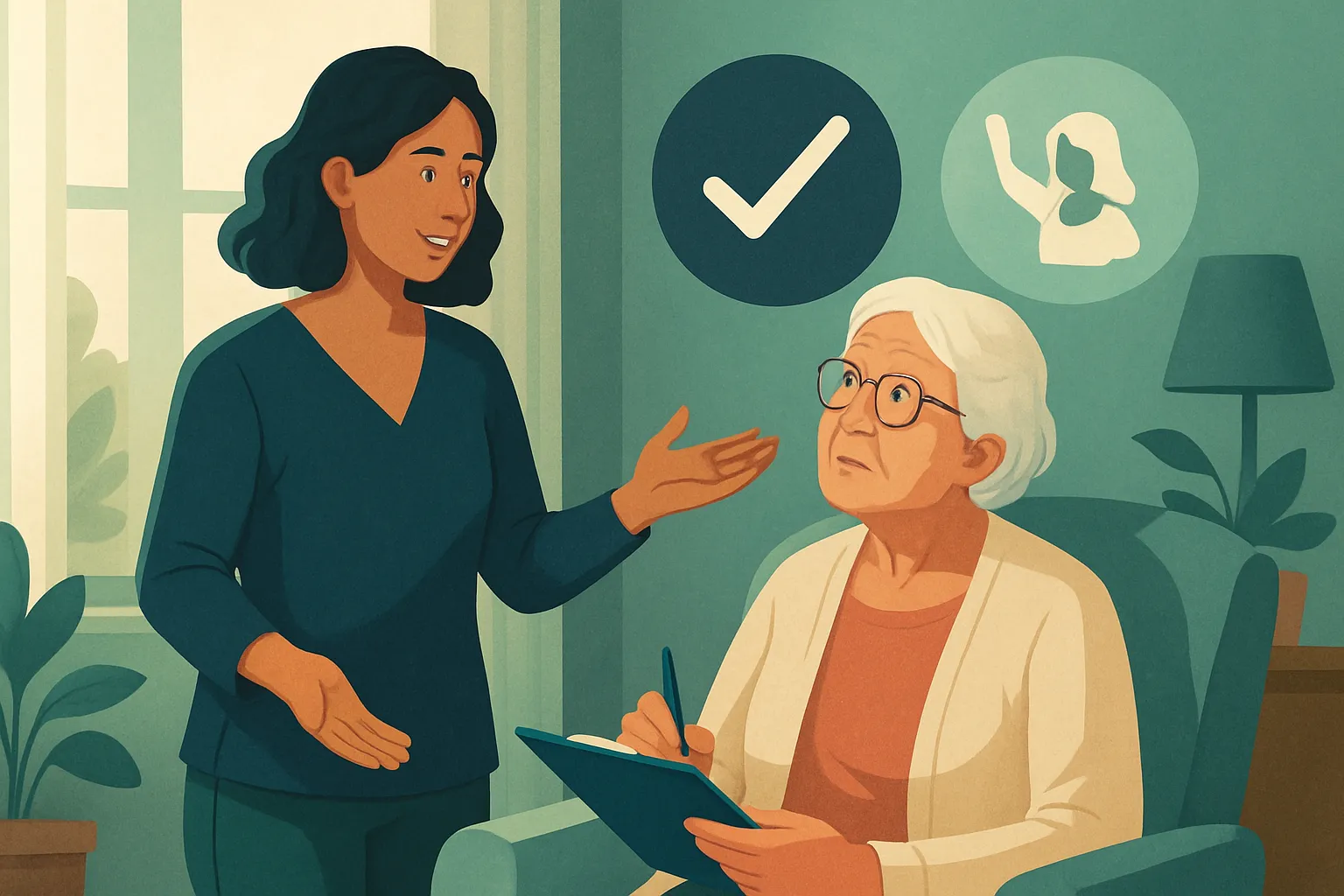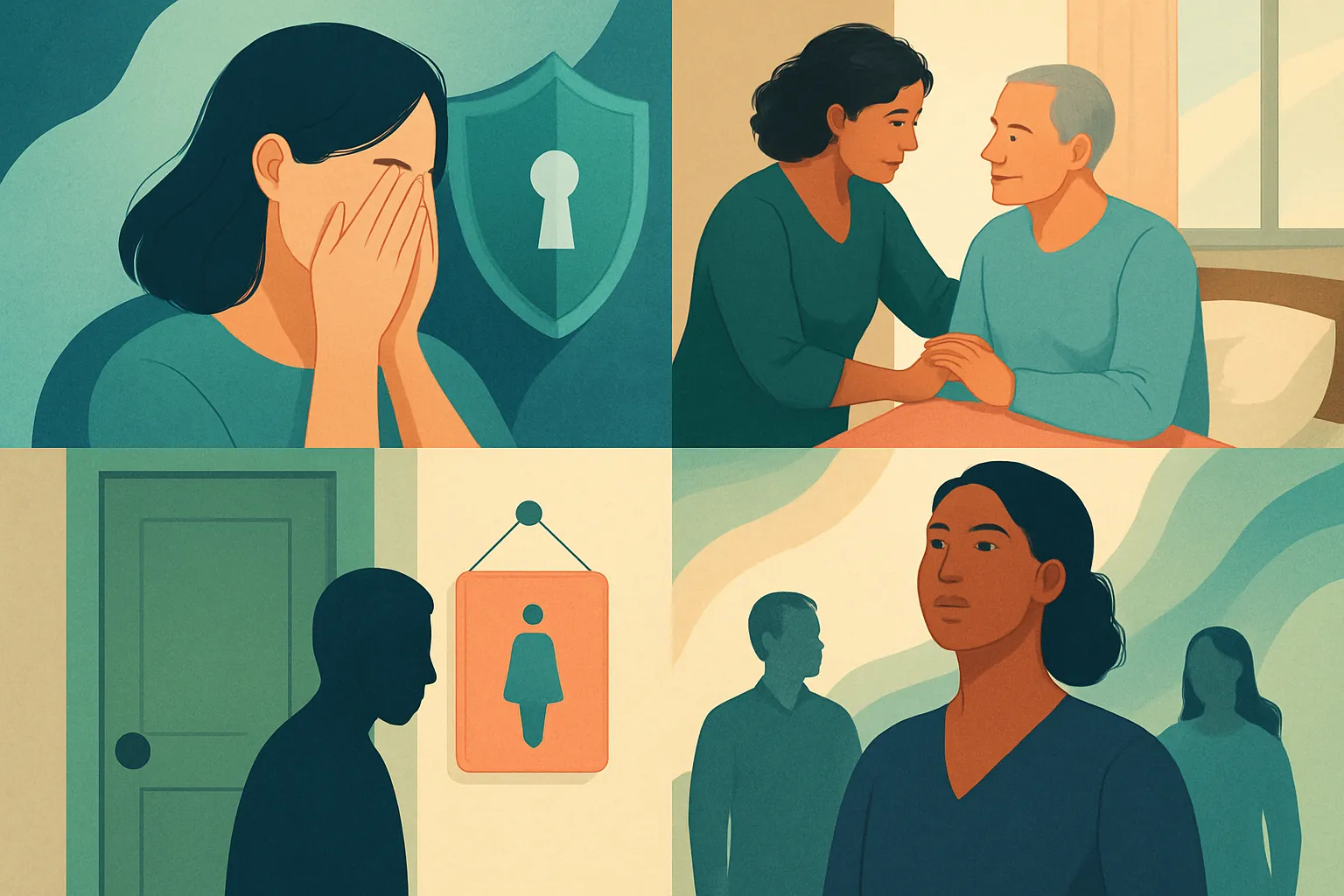Curriculum
- 15 Sections
- 15 Lessons
- 2 Weeks
- Understanding Your Role2
- Duty of Care2
- Equality and diversity2
- Person-centred care and empowerment2
- Communication2
- Privacy and dignity2
- Fluids and nutrition2
- Awareness of mental health, dementia and learning disabilities2
- Safeguarding adults2
- Safeguarding children2
- Basic life support2
- Health and safety2
- Handling information2
- Infection prevention and control2
- Understanding learning disabilities and autism2
Curriculum
Privacy and dignity
Learning Objective:
Understand key concepts of privacy and dignity in care, and learn strategies to protect and promote them.
Maintaining privacy

Privacy in a care setting involves protecting an individual’s personal space, feelings, and information. It’s crucial for ensuring safe and compassionate care. Actions like closing doors during care, ensuring people have privacy when changing clothes, and handling personal tasks discreetly are essential. Privacy protects the dignity of those in care and is a fundamental aspect of person-centred care.
- Close doors and curtains
- Use confidential areas
- Secure personal records
- Check privacy measures
Ensure doors and curtains are closed when providing personal care to maintain privacy.
Conduct discussions involving personal information in designated areas.
Ensure all personal records and sensitive information are securely stored and only accessible by authorized personnel.
Always verify that all necessary privacy measures are in place before providing personal care.
Promoting dignity

Dignity in care involves recognising the inherent worth of every individual and treating them with respect. It includes valuing personal space and preferences, and showcasing this through respectful communication and care practices. Healthcare workers need to engage with individuals by addressing them respectfully and considering their preferences when providing care.
- Strategies for Promoting Dignity
- Environment and Presentation:
Practical Tips: Use respectful language at all times. Always ask for consent before initiating any care procedure, and strive to ensure the care environment is comfortable for the individual.
Personalising the care environment by ensuring proper lighting, using privacy screens, and creating a welcoming space can significantly enhance a person’s sense of dignity.
Respect and individual rights

Respect in care goes beyond basic courtesy; it involves honouring each person’s history, culture, and preferences. This holistic approach is essential to maintaining dignity and individual rights, such as the right to privacy and to make choices. For instance, incorporating a person’s dietary or cultural preferences into their care plan ensures respect and drives safe, person-centred care.
- What is meant by ‘individual rights’ in care?
- Respect versus paternalism
- Balancing duty of care with individual rights
The entitlement of each person to be treated with respect and have their personal choices honoured.
Respectful care involves acknowledging a person’s autonomy, while paternalism can override personal preferences for perceived ‘betterment.’
Duty of care should protect individuals while also respecting their autonomy and choices, even when these involve risks.
Protecting confidentiality

Confidentiality is the practice of safeguarding personal and sensitive information about those in care. It is essential for building trust, meeting legal obligations, and maintaining the integrity of the care worker and service user relationship. Examples include safe handling of medical records and discussing personal information only in appropriate settings.
- Secure storage of records
- Private discussions
- Access entitlement
- Review protocols
Ensure all records containing private information are securely stored and access is limited to authorised individuals.
Always discuss sensitive information in private to maintain confidentiality.
Be aware of who is entitled to access personal data and protect this information from unauthorized viewers.
Regularly review confidentiality protocols to stay compliant with legal and organisational standards.
Empowering individuals through informed decision-making

Informed decision-making empowers individuals by ensuring they understand all the options available to them along with any potential outcomes. This approach fosters autonomy and supports person-centred care, ensuring that care provided respects individual preferences and enhances dignity.
- Assess communication needs
- Present information clearly
- Check understanding
- Document discussions
Evaluate the individual’s ability to communicate and understand information to tailor your approach appropriately.
Use simple, unbiased language to clearly present all available options to individuals.
Engage individuals in discussion or questioning to confirm their understanding of the information provided.
Record all discussions about options and decisions to maintain a transparent and comprehensive care plan.
Recognising and Challenging Poor Practice

Poor practice in care can negatively affect dignity and privacy, leading to potential safety risks for individuals. Examples include neglecting privacy, using disrespectful language, or failing to follow care protocols. Recognising and addressing these practices is part of the duty of care and professional responsibilities of a care worker.
- Understanding Poor Practice
- How to Challenge Poor Practice:
Identifying Warning Signs: Be vigilant for patterns such as repeated breaches of confidentiality or disrespectful care routines.
Document any incidents thoroughly, discuss concerns with a supervisor, and follow the organisation’s complaint policy to address poor practices effectively.
Supporting Choice and Control

Choice and control allow individuals to express their preferences and make decisions about their care. Respecting these choices enhances confidence and dignity, contributing to a more person-centred approach that respects individual rights. Examples include tailoring care plans to fit personal routines and allowing individuals to participate actively in their care decisions.
- “Confirm person’s preferences
- Encourage decision-making
- Documentation
- Review care options
Ensure you are aware of and respect the individual’s preferred care routines and choices.
Foster an environment that supports active participation in making their own care-related decisions.
Keep comprehensive records of choices made and any changes to care plans to ensure clarity and continuity of care.
Regularly revisit and update care plans to reflect the individual’s evolving needs and preferences.
Promoting Dignity in Practice

Promoting dignity in care practice involves consistently applying behaviours and communication styles that uphold a person’s self-worth and respect. This includes using polite language, maintaining appropriate eye contact, and tailoring care to each individual’s needs, thus reinforcing principles of privacy and respect.
What is Privacy and Dignity

The intertwining of privacy and dignity forms the backbone of compassionate, person-centred care. Privacy pertains to protecting personal space and information, while dignity focuses on recognising each individual’s intrinsic value. Together, these principles support a consistent approach to high-quality care.
- Exploring Key Concepts
- Legal and Ethical Frameworks:
The Link Between Privacy and Dignity: Breaches in privacy can lead to a loss of dignity; protecting both ensures care quality.
Understanding the policies and ethical guidelines that support privacy and dignity in care settings provides a solid foundation for high-standard care practices.